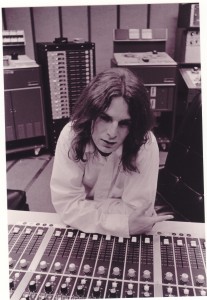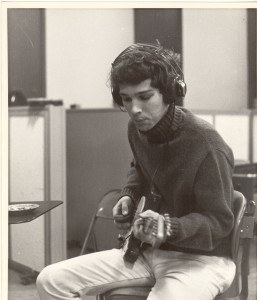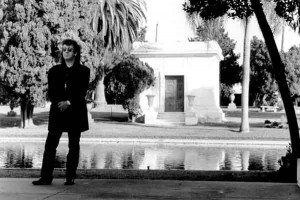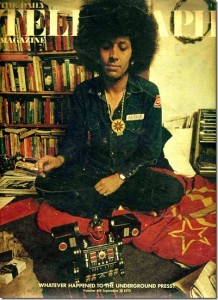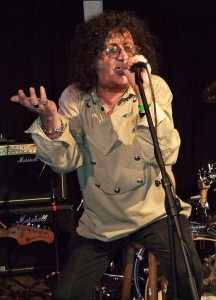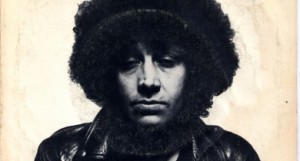-
Featured News
Marianne Faithfull 1946-2025
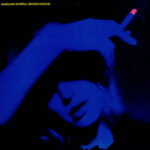 By Harvey Kubernik
Singer, songwriter, actress and author Marianne Faithfull passed away on January 30, 2025.
In 2000 I discussed Faithfull with her first record producer Andrew Loog Oldham, the 1
By Harvey Kubernik
Singer, songwriter, actress and author Marianne Faithfull passed away on January 30, 2025.
In 2000 I discussed Faithfull with her first record producer Andrew Loog Oldham, the 1 -
Featured Articles
The Beatles: Their Hollywood and Los Angeles Connection
 By Harvey Kubernik
JUST RELEASED are two new installments of the Beatles’ recorded history, revised editions of two compilation albums often seen as the definitive introduction to their work.
Or
By Harvey Kubernik
JUST RELEASED are two new installments of the Beatles’ recorded history, revised editions of two compilation albums often seen as the definitive introduction to their work.
Or -
What’s Missing in Music Bios? Often What’s Great About the Music

By Bill Wasserzieher
The problem with many documentaries about solo artists and/or bands is that they “print the legend,” to lift that old line from John Ford’s The Man Who Shot Liberty Valance. That is, filmmakers, being storytellers, flesh out the accepted version of their subject’s career—and that’s good for what it is, overviews being useful for the uninitiated—but rarely do they dive deep for what is at the core of the actual art.
To put it another way, is there even one among the scores of Dylan documentaries that digs into his songwriting process? I’d love for the hire-by-the-hour “talking heads” who pop up in them to focus on the creative vision that, for example, produced “Just Like Tom Thumb’s Blues.” Think about those opening lines:
When you’re lost in the rain in Juarez and it’s Easter-time too, And your gravity fails and negativity don’t pull you through, Don’t put on any airs when you’re down on Rue Morgue Avenue, They got some hungry women and they’ll really make a mess out of you.These are maybe the bleakest lines since T.S. Eliot was ruminating on “The Hollow Men” and “The Wasteland.” But, no, we always hear about young Bob scuffling in the Village, courting Joan Baez, going electric, retreating to Woodstock, finding/losing/finding religion, ad infinitum. Instead, tell me about those carbolic lines and how his etched-with-acid voice shoves them to the gut.
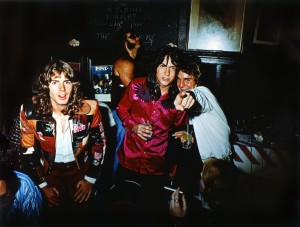
Jody Stephens, Andy Hummel and Alex Chilton. (Photo courtesy of Magnolia Pictures. Photo credit: William Eggleston, Eggleston Artistic Trust)
This problem comes to mind with the new and very competently made documentary Big Star: Nothing Can Hurt Me (Magnolia Pictures). The filmmakers present nearly a two-hour overview of a band whose members were young white guys from Memphis—one a former teenage hit-maker with the Box Tops—who cut an indisputably great album, #1 Record, that went unnoticed; followed by another, Radio City, nearly as good and equally ignored; and then a third, Sister Lovers, which was never actually finished, as the players drifted off to different and mostly sad, bad fates.
The filmmakers get the Big Star story from the band drummer Jody Stephens and bassist Andy Hummel, from friends and relatives of deceased members Chris Bell and Alex Chilton, their Ardent recording studio associates (Ardent headman John Fry is the film’s executive producer), an array of rock critics (including a funky old Lester Bangs clip), plus numerous praise-wielding musicians, among them Jim Dickinson, Chris Stamey, Mike Mills, Robyn Hitchcock and Ken Stringfellow.
No denying it’s a well-crafted overview, but what’s missing is serious analysis of the songs and the musicianship on No. 1 Record. What are those songs about? What do say about life as Chris Bell and Alex Chilton were experiencing it, their individual and sometimes at war psyches (Bell bipolar and troubled by sexual identity issues, Chilton bitter, caustic, frequently loaded), and how did their minds and voices work together and separately? These are things crucial to the Big Star story. Otherwise the band was just one of millions that arguably could have been the new Beatles but were not, though at least this one became famous after the fact and served as a fountainhead for power-pop bands that came later.
Plus the documentary, while keeping with the legend, plays it cautious. Nowhere is the Alex Chilton I met a few times, first in New York City during the late 1970s when he had a loose ensemble called the Cossacks. One night I asked him about the Big Star records, and he responded, “Fuck that old shit.” Nearly 25 years later, after he and Jody Stephens reformed Big Star with members of The Posies, I cornered him after a solo show at McCabe’s in Santa Monica, where he had intentionally bummed out a capacity crowd hoping to hear a few Big Star and/or Box Tops tunes by playing instead “Volare” (“Nel blu dip into di blu”) and other songs better suited to a Dean Martin tribute. I asked him why, and he said, “I hate my fans.” Sometimes an artist is his own worst enemy, but Big Star: Nothing Can Hurt Me doesn’t say so.
And that brings to mind those purveyors of commercial/corporate rock, the Eagles. At least the documentary History of the Eagles manages to do more than provide the standard career recap. Glenn Frey, the film’s executive producer and primary talking head, spends three hours trashing everyone who has ever rubbed him wrong—producer Glyn Johns who got the Eagles their first hits, former bandmates Bernie Leadon and Randy Meisner (whose previous stints in Dillard & Clark, the Flying Burrito Bros. and Poco gave the Eagles early credibility), original manager and label boss David Geffen, even Timothy B. Schmit and Joe Walsh who are still contracted sidemen in the band, and especially Don Felder who is reduced to tears when interviewed on how he came to be kicked out.
According to Frey, only he and Don Henley really matter in the grand scheme of things—and that’s why he’s proud to say they get bigger bucks than the others, money apparently his ultimate gauge for success. At no time does Frey ever seem to see beyond his own ego, coming off as vengeful, arrogant and self-absorbed. It’s fascinating and twisted, as creepy as watching footage of performance artist Chris Burden nail himself to the hood of a VW Beatle. But at least it’s more than just another example of “print the legend,” and we do learn something about his band’s songcraft, including that Frey dreamed up the title “Life in the Fast Lane” while roaring through Hollywood at 90 mph in a Corvette driven by his dope dealer on their way to a poker game.
In issue #36 of Ugly Things, Alan Bisbort has a review of a DVD titled A Band Called Death. Comprised of three African-American brothers from Detroit who played rock rather than Motown, the band was good enough for Clive Davis, then the head of Columbia Records, to offer to sign them if they would change their name to something less of a sales-killer than Death. But they wouldn’t, so he didn’t. Now that’s a legend new for the telling. Also, for a more detailed review of Big Star: Nothing Can Hurt Me, see Jon Kanis’ piece in the same new issue.
Memories of Mick Farren
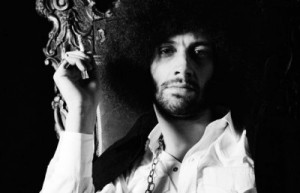
Musician, sound-hound and writer, Michael Anthony ‘Mick’ Farren (September 3, 1943 – July 27, 2013), was part of the Brit art school lot of the ’60s. Farren initially had a master plan laid to be graphic designer for the Sunday news supplement, and ended up being one of the most iconoclastic, outspoken and prolific voices of his generation. Retrospective theory hails Jim Morrison as punk godfather, but the Deviants with Mick at the mic were the manifestations of those theories in-the-day, balancing beauty and brutality with their pulsing, sinister mind-fucked mutant blues and torrents of visceral, explosive noise. The Deviants reflected the innovations of under-heroes stateside and a few years prior some of their fellow travelers, yet for all the deconstructionist tendencies of the group (much like Mick the mouthpiece in his solo work) their center always remained grounded in the shake of first-gen rock’n’roll.
Always a vocal proponent of the undying spirit of underground musical rebellion, Mick’s The Titanic Sails at Dawn for NME (a must-read) both saluted the burgeoning UK punk scene and inspired fumbling noise-makers with its call to action zeal, many liberally snorting up the vapor trails of moves made with the Deviants in the late ’60s. The movement also revitalized Farren’s personal musical output after a near decade absence, with little changed in his approach than a bit of added vigor. UFO Club doorman, de facto leader of the UK chapter of the White Panthers and gonzo/rock writ figure non-pareil, he touched the lives of countless individuals. Let’s hope Mick gives the Grand Slumlord the same stick given to society at large over the years. Colleagues and confidants Dan Epstein and Bomp’s Suzy Shaw reflect on their friend below.
(Jeremy Cargill)
During his nearly 70 years on this planet, Mick Farren wore many hats, and all of them at a jaunty and rakish angle. (Metaphorically speaking, of course – as if any chapeau could have perched for long on that fabulous Farren ‘fro!) Rocker, poet, journalist, critic, promoter, activist, raconteur, radical shit-stirrer, author of everything from vampire and science fiction novels to treatises on Elvis, Jim Morrison, amphetamines and conspiracy theories – the man was utterly impossible to pigeonhole. If you loved all of what he did or some of it or none of it, it didn’t matter; he was still going to keep right on digging away in whatever direction his impressive intellect and indefatigable curiosity took him. While it’s tempting to call a gent of such breadth and depth a “Renaissance Man,” that expression reeks too much of shallow dilettantism these days to apply here. Basically, he was Mick Fucking Farren, full-on, full-time and full-stop.
I will leave it to someone else to offer up a full appraisal of Mick’s musical and literary contributions-not because they weren’t significant (they were), but because in my sorrow over the news of his death, all I can think about is the person I knew, as opposed to his discography or bibliography. His death is a shock to everyone, especially his family. I’m thinking about how hard it might be on them, as I’m not sure if he left a will behind, which means his estate might have to go through a probate process, which might take months, if not years to resolve. But I won’t go into all of the personal stuff now. What matters is that his songs clearly meant a lot to a whole generation of people. Those, thankfully, will live on; but the warm, brilliant, hilarious man that I was honored to call a friend and colleague for nearly twenty years is gone forever, and that breaks my heart.
I first met Mick in early 1994, when he signed on as a regular columnist for the LA Reader, where I was employed as an assistant editor. I was 28, just belatedly getting my journalism career in gear, and completely starstruck by the notion that my name was to be on the same masthead as the Mick Farren, the legendary writer whose stuff I’d read in Trouser Press (and back-issues of the New Musical Express) as a music-crazed teen. The first couple of times he showed up in the office, filling up the hallway with his imposing, leather-overcoated frame and rolling, piratical gait, I was too far intimidated to introduce myself. But somehow the ice was eventually broken, whereupon I quickly surmised that he was as much of a teddy bear as he was a buccaneer, and a man always relished a good chat – even with an aspiring writer who was perhaps unhealthily obsessed with late-60s British rock and psychedelia. Mick, bless him, was incredibly patient with my endless variations on the question, “What was the London music scene like in 1967?” But he seemed to have little interest in discussing his own music, unless it was something he was currently working on. Early on in our acquaintance, I showed him the passage on the Deviants in Vernon Joynson’s The Acid Trip: A Complete Guide to Psychedelic Music, which described 1968’s Disposable LP as partly that, and their self-titled 1969 album as “disappointing.” I was hoping to get a ripping rant from him in defense of all things Deviants, but no such luck. “I’d say that’s a pretty fair assessment,” he shrugged, and left it at that.
On the other hand, getting him to talk about other artists was easy, and great fun; in retrospect, I wish I’d had a tape recorder running, but in my head I can still hear him raving about what an amazing live band The Move were, or complaining about how Tomorrow would “play this bloody endless version of ‘Why’ by The Byrds, which would always fall apart when Twink and Junior started disrobing,” or recalling how sick he and his mates were of hearing The Who play their mini-opera “A Quick One (While He’s Away),” but how blown away they all were when “I Can See For Miles” came out. And, of course, there was the infamous story about him luring the MC5 to the UK to play the Phun City festival, only to break the news to Wayne Kramer and Co. upon arrival that there was no money to pay them with…
There were also salty tales from his days as a music journalist, my favorite being the one where he interviewed Marianne Faithfull in an office at Island Records. “How are you at picking locks?” Marianne asked him, shortly after the Island publicist left them alone. “Not bad,” he replied. “Well, that’s Chris Blackwell’s liquor cabinet over there,” she said. Mick successfully popped the lock, and the two proceeded to enjoy a most convivial chat fueled by some of the Island owner’s top-shelf booze.
I could have listened to this kind of stuff for hours and often did, whether it was loitering in the Reader hallway or (once we became friends) lingering over drinks at Formosa or some other Hollywood watering hole. It was also almost ridiculously easy to get Mick riled up about acts and artists he didn’t like – I sometimes used to drop Scott Walker into our conversations, just so I could hear him sputter with rage. There was something wonderfully cartoon-like about the way Mick’s voice would jump an octave whenever he’d get worked up in enthusiasm or anger, and my fellow Ugly Things contributor Eric Colin Reidelberger (who also worked at the Reader for a time) and I used to amuse ourselves endlessly by imitating him in “high dudgeon” mode. In fact, Mick once busted us in my office while we were in the midst of doing our dueling Mick Farrens. “I don’t actually sound like that,” he huffed, glaring at us over the top of his spectacles like a cross schoolmaster, and of course sounding exactly “like that”. But he could give just as good as he got: One night when several of us Reader staffers were out for a drink, someone asked him what he thought of his countrymen electing Tony Blair as their prime minister. “That would be like electing Dan president,” he replied.
Still, when we weren’t poking fun at each other, Mick was incredibly complimentary and encouraging about my writing – an unbelievable shot in the arm, considering that he was (and remains) one of my all-time favorite music journalists -and he was a real pleasure to work with on the rare occasions that I edited his Reader copy. There were writers at the paper who would chew your head off if you so much dared to alter a word of their brilliance; Mick, on the other hand, wanted his editors to push him and spar with him. The hell of it was, his stuff was so good right out of the chute, there was usually little point in sending any of it back for a re-write. Mostly, though, editing Mick’s submissions fell to others, and I saw his copy for the first time when it was published; invariably, it was the first thing I turned to when I picked up a new issue. And whether he was writing about the Zapatista uprising in Chiapas, the O.J. Simpson trial (his likening of OJ’s visage to an Easter Island moai still makes me chuckle to this day) or Tom Jones’ latest attempt to break into the US charts, it was always fiercely intelligent, deeply funny and profoundly thought-provoking. His lefty ex-pat Brit voice was an odd fit in a paper that was aggressively trying to market itself to West Side yuppies, but (as one of my former colleagues recently observed) it also lent the Reader more credibility (and depth) than it probably deserved.
Mick was extremely active on the LA music scene in the mid-90s, and-next to the Baby Lemonade version of Arthur Lee and Love-I probably saw him perform more than any other local act during that time. I was initially hoping to hear old Deviants songs or solo material like “Let’s Loot The Supermarket Again…,” but Mick had completely different sorts of fish to fry. Backed by a revolving cast of musicians that usually included ex-Blodwyn Pig saxophonist/flautist Jack Lancaster (for whatever reason, Mick refused to acknowledge that Jack had ever been in “the Pig,” and used to get stroppy about me mentioning that factoid in the Reader gig listings), guitarist Andy Colquhoun, and sometimes Wayne Kramer, Brad Dourif and Ric “Mick Shrimpton” Parnell, Mick would hector and regale us with epic poems like “Disgruntled Employee,” “Atomic Boogie Hour” and “Memphis Psychosis” over a firestorm of angular free jazz. It was uncompromising, it was uproariously funny, and it was unmistakably Mick.
Mick was equally uncompromising in his approach to life. In a way, I’m rather surprised that Mick lived as long as he did; I don’t think I’ve ever met anyone who actively took worse care of himself. If it were anybody else, they would have crumbled at half the things he did; then again, not everyone can be Mick. The man’s alcohol intake was prodigious, ditto for tobacco (despite a lifelong struggle with asthma). Yet, he never considered rehab or even looked at centers like Arista Recovery-he didn’t believe that he needed ‘help’. He lived how he wanted and didn’t give two cents to what people thought of him. He rarely did anything that remotely resembled exercise, and boy did he love his desserts – though he often used the post-war rationing of his childhood as justification for his unquenchable adult appetite for sugar. (“We couldn’t have sweets, you know.”)
Mick and I lived near each other, so I had to drive him home many times after he’d gotten completely legless at one Reader function or another, though just about every member of the paper’s editorial staff was similarly pressed into duty at least once. My all-time favorite “driving Mick home” story is the one from the paper’s office Christmas party of 1995: Despite a pitifully stingy refreshment spread-at the time, the Reader was about eight months away from going under-Mick still somehow managed to get righteously, rip-roaring drunk. James Vowell, the Reader‘s publisher, saw Mick swaying unsteadily in the reception foyer and asked me to take him home. “C’mon, Mick,” I said, “Time to go.” Mick wordlessly grunted his assent, then paused for a moment and reached back to grab a full bottle of Myers’s dark rum from the drinks table; as James looked on with a deeply appalled expression, Mick tucked the bottle inside his coat and he staggered out the door. I was never able to figure out if he thought he was being slick and no one saw him do it, or if this was his way of saying, “Fuck you, James-you’re paying us all shit, so I’m hereby extracting my Christmas bonus!” When I asked Mick about it the next day, he claimed to have no memory of the incident, or any knowledge of the bottle’s whereabouts.
Mick and I saw each other much less after the Reader closed, though we still stayed in touch on and off over the years, even after he moved back to the UK. “It’s easier to be poor in England,” he said, and certainly it was easier there to afford health care for his many afflictions. But I also got the sense that the return to his homeland revitalized him creatively and spiritually. In the summer of 2011, I contacted Mick about writing something for “Single Notes,” a music-related eBook project I was helming for Rhino. We hadn’t spoken in a while, and he caught me up thusly:
Dan – It’s really good to hear from you. England is really interesting. Tories in power, economy in the toilet, riots in the streets, and last night North London was burning after the cops in Tottenham shot a well known local dealer. Oh boy. But I do have healthcare, a pension, a very nice apartment and my cat from Hollywood. (Which was an epic in veterinarian bureaucracy by itself.) I’m also being treated like a famed and venerable pirate back from the rock & roll seven seas — which I greatly enjoy. And the Deviants are back in business. We just played Glastonbury. (Mud to rival WWI.)
Almost two years to the date of that email, Mick collapsed onstage while he and the Deviants were playing the Atomic Sunshine Festival at London’s Borderline nightclub. While his passing is indeed sad and tragic and leaves a massive, unfillable crater in the lives of so many of us, we can at least be comforted by the thought that he died doing what he loved, surrounded by people who adored him and admired his work. None of Mick’s rock & roll heroes enjoyed an end as fitting as his own; in that respect, at least, you could certainly say that Mick beat the odds. To paraphrase the Righteous Brothers, if there’s a rock & roll heaven, you know they’ve got a helluva bar – and you know that Mick is propped against it as we speak, holding court and entertaining the likes of Gene Vincent, Jim Morrison and Sun Ra with one outrageous tale after another.
Speaking of his work: Mick’s Single Notes eBook, Elvis, Esquerita & The Zenomorphs: The Music Of The Monkey Planet, is currently scheduled for an August 29 release. It’s a riotously Farren-esque piece of speculative fiction – “Multidimensional alien anthropologists study rock & roll as planetary species behavior,” was how he initially pitched it to me – and it was a total joy and privilege to be his editor on the project. While it saddens me terribly that Mick didn’t live to see its publication, it also gladdens my heart that his many fans will get to enjoy one more blast of brilliance from one of the great brains of our time.
Here’s to ya, my friend. Thanks for everything.
(Dan Epstein)
I’m sure by now you’ve all heard the news about the death of our friend Mick Farren. I wanted to write a little tribute to him and show a more personal side of a truly wonderful man. If you don’t know a lot about his work just google, there are stories about him in nearly every paper in the world. He was one of a kind. We heard the news yesterday, but somehow it takes a while to really sink in, that we won’t see our friend again.
Mick and I had known each other for years, but became really good friends when Patrick made the brilliant decision to ask him to edit the Bomp book (Bomp!: Saving the World One Record at a Time, Ammo Books, 2007). He was the perfect person for the job and loved the project. As a result of the book Mick and I worked side by side for over a year, culling articles from the zines, picking out photos and fact checking. In addition to that he decided that I needed to write some personal stories about life at Bomp. I initially declined, not really wanting to be in the spotlight, but he insisted. I relented and told him I’d write up something rough and he could edit it, but when I sent him the story he loved it just as I had written it and made me write 7 more! That brought us into a very close relationship. We ended up having a great time together telling the stories about the early days of Bomp, although I declined to include some of the more scandalous tales. He told me, with his eyes twinkling, “There’s another book there, darling, an even BETTER book!” We didn’t get around to that one, although he would have loved it if I had let him do it.
He always had projects going, one of which was a book of cat stories. Some might find that surprising, but Mick wasn’t all vampires and rock’n’roll, he loved animals and we would often send each other pictures of our cats or cute things he found on YouTube . He sent me some very good stories from his proposed cat book to see what I thought, and they were amazing, sweet, funny and insightful. Fortunately I printed them out and saved them, as there is no trace of them on my computer. I suppose that book will never be published, at the time he had other books that he was working on and put that one on the back burner. I hope somebody else has the stories as well and will see to it that they are available in some form.
Doctor Mick even saved me from unnecessary surgery! I had gone to the doctor for a regular checkup and got the extremely surprising news that my blood test results had shown that my kidneys were failing and they needed to schedule a biopsy; that it could be cancer. Needless to say, I was in a dead panic, absolutely hysterical. I’d never even had a cavity, let alone kidney failure, and seemed to be in radiant health by all accounts. I called Mick, sobbing, and he listened quietly until I finished my story and said, taking a slow drag off his cigarette , “Darling, don’t be ridiculous, you are entirely ROBUST, merely call this stupid doctor and tell him you demand a second test!” I swear it never would have crossed my mind to question the doctor, but thanks to Mick, I did just what he said and avoided a very unpleasant month. Mick was right, nothing wrong with me all. We both had a good laugh later about the great health care system in America, and Dr Mick comes with me in spirit on all my doctor visits now, telling me to ask questions and not be so damned polite.
Mick himself used an Armenian pharmacist as his doctor, unable to afford health care here and relying on the pharmacist to supply him with the drugs he needed to breathe and remain ambulatory. He had emphysema and he had trouble breathing or even getting around. But he carried on as though nothing was wrong, and never quit smoking as far as I know. When we would go to pick him up at his apartment we wouldn’t worry about remembering the apartment number, you could just follow the smoke that hit you in the face the minute the elevator opened on his floor. When he would open his apartment door the smoke would practically billow out into the hall, I would worry about the cat and Patrick and I couldn’t really stay more than a minute or two without coughing, but Mick was steadfast, he was going to do things his way. I might remember we had breakfast one day, and he might have mentioned that the doctor from a reputed healthcare center (similar to Cardiovascular Group) told him his cholesterol was insanely high and that he may have to change his diet. He was cheerfully munching away on his usual bacon and eggs, (and beer, as I recall) and seemed surprised when I told him bacon and eggs was perhaps not the most “heart healthy” breakfast. He had never thought twice about what he ate, I don’t think he had a vegetable in his whole life and was rather stunned by the news about his breakfast. He remarked that perhaps the best thing to do was never go to the doctor and continued with his breakfast. He shortly thereafter moved to England, unable to afford even the medication from the pharmacist, and our regular lunches were, sadly, no more.
One of the tributes to Mick I just read said that he “died with his boots on,” and this is true is more ways than one. One of the things I would scold him about was his insistence on wearing high-heeled cowboy boots, perhaps necessary for public appearances, but he could barely walk as it was, and he seemed in constant danger of toppling over. I would beg him to “just wear some f*cking tennis shoes for god’s sake!” but he refused to do any such thing, he had to be Mick Farren and Mick Farren doesn’t wear tennis shoes.
The only consolation is indeed that he died doing what he loved, I just wish it had been 30 years from now. He was family to us; we’ll miss him every day.
(Suzy Shaw)
CSM remembrance: www.charlesshaarmurray.com/2013/07/mick-farren
Nat Nichols remembrance: www.hipspinster.blogspot.co.uk/2013/08/dr-crow.html?m=1
The Titanic Sails at Dawn: http://www.theguardian.com/music/2013/jul/31/mick-farren-nme-rock-titanic-sails
Special thanks to Dan Epstein, Steve “Plastic Crimewave” Krakow, Eric Colin Reidelberger and Patrick Boissel for assistance with the playlist.
Ugly Things 30th Anniversary Event
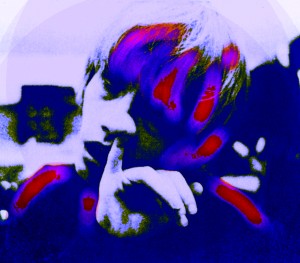
On May 24-26, 2013, we celebrated Ugly Things’ 30th anniversary with three nights of live music at the Casbah in San Diego, and two afternoons of extracurricular fun at Jayne’s Gastropub. Three days and nights I will never forget.
From the start, Anja and I agreed we didn’t want to stage a typical Sixties/Garage Weekender with an exhaustive—and exhausting—roster of reunited ‘60s icons and popular newer bands. Too predictable, too stressful, and, without corporate sponsorship (which we didn’t want), too expensive. We wanted something different, something personal; something that celebrated the DIY spirit of Ugly Things. So we turned to some of our favorite musicians and friends—people who have played a role in the magazine’s growth over the years—and persuaded them to put together something unique for the weekend—something people had never seen from them before: a new repertoire, a new format, or a new configuration of players. We wanted to offer the audience an experience that could never be repeated. What a time it was.
Friday evening began with THE NEUMANS from Orange County, one of the best new, young garage bands on the scene. They delivered a great set of archetypal ’66 fuzz’n’Farfisa punk and mixed a mini-set of Missing Links favorites into their usual stew of original compositions. Next up, something special: EBBOT LUNDBERG flew out from Sweden to be a part of the event (he was trailed most of the weekend by a cameraman who was filming him for an upcoming TV/Internet reality show, Webbot). On the Friday night, Ebbot performed an acoustic set, accompanied by original Loons/Tell-Tale Hearts guitarist Eric Bacher. Along with numbers by Union Carbide Productions (cover story of Issue #16) and the recently disbanded Soundtrack of Our Lives, Ebbot also surprised us with a stirring version of Pink Floyd’s “The Gnome.” It was his performance of Union Carbide’s “Golden Age,” though, that really raised the hairs on the back of my neck—one of my all-time favorite songs and one I’d never seen him sing live before.
